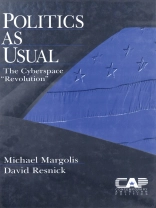Cyberspace is no longer a mystery. It has become irrevocably intertwined with everyday life, facilitating everything from reading the news and paying the bills to ordering birthday presents. We are in the midst of a revolution in mass communication, and there now exists the technology for creating new forms of community, empowering citizens, and challenging existing power structures. But will such changes occur?
In this fascinating book Michael Margolis and David Resnick ponder the effects of cyberspace on American Politics. Our political system tends to normalize political activity, and thus, the Internet′s vast potential could be lost, rendering it just another purveyor of ignored information. This broad examination begins with a history of cyberspace and moves through discussions of parties, political interest groups, candidates, mass media, information dissemination, and commercial uses of the Internet.
Politics as Usual offers an innovative and exciting look into previously ignored aspects of the Internet and American politics.
Inhoudsopgave
The Normalization of Cyberspace
Democracy in Cyberspace
A Brief History
Parties and Interest Groups
Organizing, Lobbying and Electioneering in Cyberspace
Elected Officials and Government Bureaucracy in Cyberspace
The Internet, Mass Media and Public Opinion
Doing Business on the Web
New Rules or New Taxes?
Gambling on the Internet
A Case Study in the Politics of Regulation
Criminal Activity in Cyberspace and What to Do About It
Democracy and Cyberspace
A Peek into the Future












